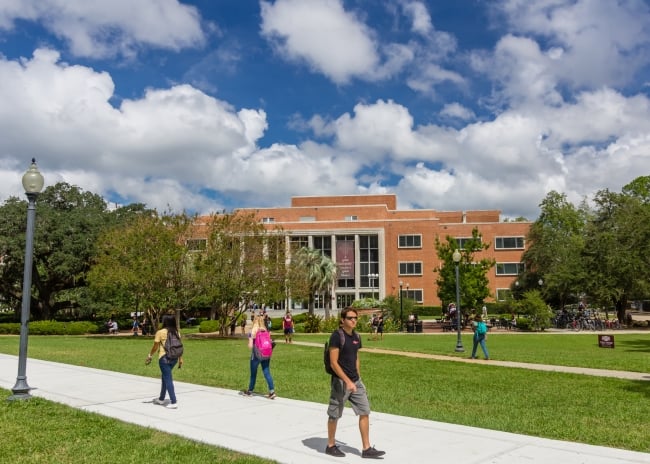You have /5 articles left.
Sign up for a free account or log in.

Academic guides at Florida State University assist students who are struggling, providing referrals to other campus offices and support.
Bryan Pollard/iStock Editorial/Getty Images Plus
Colleges and universities offer a wide range of student support services, but when students need help, do they know where to turn? A June Tyton Partners survey found 60 percent of students are unaware of the full scope of services offered to them at their college or university.
“Especially for new students, there is just an overload of information,” says Dana Auvil, manager of the Center for Academic Guidance at Florida State University. “They learn a lot of things; they have a lot of resources, a lot of offices that are providing information to them, and it’s a lot to figure out what part you’re going to focus on.”
To make resources more accessible to students, many institutions have hired staff who focus on academic support, providing referrals to service departments or sharing advice on how students can improve their academic preparation.
Leaders at Florida State created the Center for Academic Guidance in 2023 to strengthen the university’s web of supports available by working one-on-one with learners who need additional help.
What’s different: Student success coaching is growing in commonality on campuses across the nation, with expert staff providing skills guidance and resource connection. Tyton’s survey found 58 percent of employees (representing 900 institutions) say their college or university offers student success coaching.
Many of these models are opt-in, preassigned or embedded in a scholarship program, as well as a requirement for a select few who may be identified as needing additional help. Florida State’s program is more of a safety net.
“We have a lot of great programs that are already in place. We have our college life coaches; we have our advisers,” Auvil says. “But this came into place as an … intentional program to make sure that … we’re not missing students who may need additional support.”
How it works: The center launched last spring and works in partnership with the Office of Institutional Research to identify struggling students. The offices look for markers that suggest a student may be less likely to persist or graduate so they can intervene early.
“We are more of a reactive student support based on academic performance,” Auvil explains. “We work with students and really try to get to the bottom of what happened.”
The center employs six full-time guides who manage a caseload of around 100 students each semester, and Auvil also provides guidance to students. Each guide reaches out to their group of students, offering help and setting up meetings with those who engage.
The goal is to capture students who are not utilizing existing resources or receiving help from other support offices, allowing each office to do what they do best. Academic guides work closely with FSU’s early-alert program, Proactive Referral and Engagement, to make sure students aren’t being contacted by multiple offices to get help, freeing up communication lines.
The Center for Academic Guidance also partners closely with other staff on campus to ensure a warm hand-off for students.
“We serve as conduits to some of the other offices on campus,” explains LaShae Roberts, assistant dean and director of Advising First. “Instead of just sending them somewhere, they can actually have a touch point with the person who’s going to follow up with them.”
Addressing student needs: When launching the office, staff expected to support students with academics—teaching time management and effective study habits or helping a student adjust to college life away from home.
When they started meeting with students, however, staff realized there was a larger swath of issues that impeded academic progress, including past trauma, family hardships, personal health issues, basic needs insecurity and mental health concerns.
“I don’t think we were prepared for what the students were going to bring to us,” Roberts says. “We knew that we were outreaching to them based on some data we received from institutional research, but we weren’t sure the stories, the circumstances, the hardships, the situations we were going to encounter.”
As a result, FSU leaders ensured guides had proper training and were equipped with the right resources to help students in their academic pursuits.
FSU trains its advisers in a developmental advising approach, looking at the student’s experiences holistically, because “life doesn’t take any breaks because you have important things to do,” Roberts says. “The difference with the guide program is that they have the time built into their schedules to actually dive a little bit deeper [compared to advisers].”
Auvil found the various backgrounds of her team—coming from a variety of roles as advisers, social workers, case managers or communications professionals—aided the office’s work, because student challenges are often multifaceted, and the different skill sets complemented each other well.
The impact: In spring 2023, guides reached out to 800 students and had over 400 guidance meetings. Of students who met with guides, 92.5 percent retained to the fall term and averaged a GPA increase of 0.67 points.
This fall, outreach was scaled back to around 600 students, giving staff more bandwidth to address student issues. Around 50 percent of the students who heard from guides had engaged with them as of Dec. 6, and students continued to seek help as finals week approached.
Future aims are improving communication to students and expanding services to include additional learners or take referrals from campus stakeholders.
If your student success program has a unique feature or twist, we’d like to know about it. Click here to submit.




